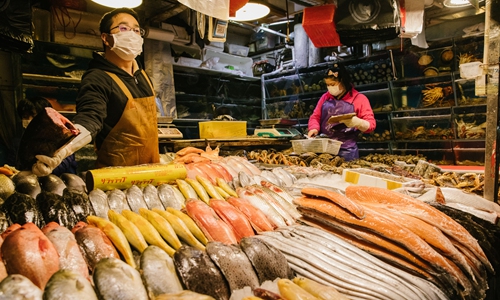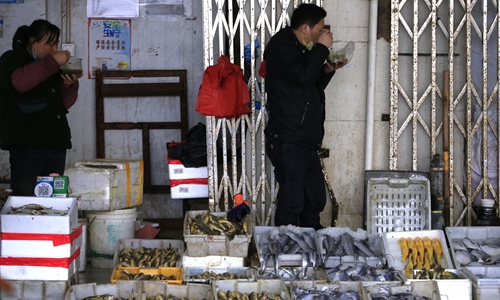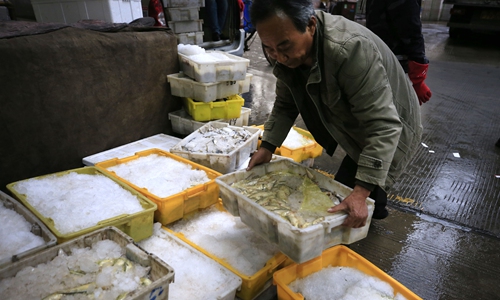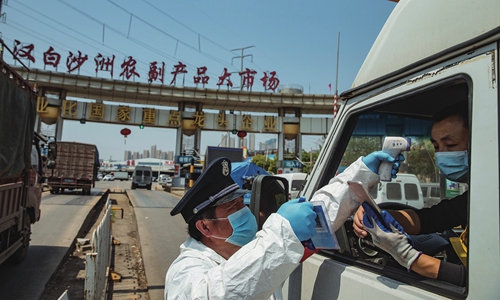Editor’s Note:
Western politicians and media outlets have now found a new target in their “coronavirus blame game” against China, as Wuhan, the Chinese city hit hardest by the coronavirus outbreak, lifted its 76-day lockdown and has gradually reopened its farmers and wet markets. They alleged the wet markets are the origin of the virus and incubators of human disease, and asked the permanent shutdown of the markets.
As it is deeply related to their daily life, angry Chinese people believe such groundless and ridiculous request of closing those markets, which plays a pivotal role in providing them with fresh, affordable and sustainable daily food, is equivalent to “forbidding us from eating,” and market vendors decried whoever asked China to close these markets and demanded them to support vendors financially.
Also, Western politicians and media, including the Wall Street Journal, New York Times, USA Today and Bloomberg, deceived by their preconceived idea of Chinese markets, accused such markets as hotbeds of selling wild animals, where on-site slaughter of animals is prevalent, and operated under unhygienic conditions. Some like the New York Post, a US newspaper, went further by saying that China is planning to export those wild animals after it bans consuming them inside its soil.
GT staff reporters conducted a thorough investigation of wet markets in Wuhan, Shanghai, Beijing and Guangzhou, to shed light on the real situation of the “disputed” markets.

Wuhan resident: “I am not a fan of eating bats – it’s disguisting!” “Never heard of Huanan wet market until the viral outbreak.”
As Wuhan lifted its lockdown and life returned to normal, its wet and farmers markets are also opening to the public.
This, however, offers yet another target for foreign media outlets, include Fox News and USA Today, which demonized those markets as a place “full of bizarre and unusual items.” USA Today referred to those markets as “exotic-animal wet markets.”
The ongoing global COVID-19 pandemic has made Wuhan people the center of public opinion. Several Wuhan residents reached by the Global Times defended Wuhan people’s name from foreign media which alleged that consuming wildlife is prevalent in Wuhan.
“Do those accused Wuhan people know what a bat looks like? I cannot say for all, but I can guarantee most Wuhan people would say no when they are served bats, it is disgusting,” said Xia Yiwu, a Wuhan local.
Xia also said most Wuhan people are not particularly interested in wildlife consumption. “I only saw people eating hare once, and never saw any market selling wildlife during my several decades’ living in this city.”
In response to some media’s fake reporting, the Chinese Embassy in Israel said in March that “Chinese eating or selling bats caused the outbreak” is a rumor that has been debunked by a host of international news agencies, and accused the incessant behavior of spreading rumors of exposing their agenda on China.
Zhang Zheyan, manager of Xiaodongmen market in Wuchang district, told the Global Times that he witnessed several underground wild animal trading spots in Wuhan a few years ago. “But they are out of sight in Wuhan’s big markets now as the local governments have imposed strict measures and heavy fines on any violator.”
GT reporters have visited four wet and farmers markets in Wuhan. Not even live poultry was seen being sold in those markets. Meat merchants would shake their heads when they hear the word “wild animals.”
“It’s illegal, you would go to prison, how can someone be so stupid to sell it in the open market?” asked a crab vendor in Baishazhou market in Wuhan’s Hongshan district.
The Huanan wet market, allegedly the center of the COVID-19 outbreak, was one of the markets in urban Wuhan which specializes in seafood products. It was ordered to be temporarily closed in January when the viral outbreak was first reported, and it remained closed on Saturday.
One can hardly take a peek inside the market as it was enclosed by tight blue blockades. Surrounding shops also remain closed. A guard at the entrance told the Global Times that after the outbreak, even pedestrians would take a detour to avoid walking near the market.
A vendor who used to sell seasoning products in the Huanan wet market was seen moving his products from inside the market to a waiting van outside. “I am moving out of Huanan and opening my own business in a nearby market,” he told the Global Times.
As for rumors online that the controversial market will be closed permanently, the vendor said he has no idea, but many former vendors from the market are also moving out, as they cannot afford to wait for its reopening.
As Huanan remains cordoned off, there’s no chance to see whether it is a place for wildlife. Some media posted pictures and reports online early in January claiming civet monkeys, pheasants, field mice and other wild animals were being sold there.
The Beijing News reported in March that officials from Wuhan disease control and prevention center confiscated the market’s wild animals after the outbreak.
But for most Wuhan residents, the now notorious wet market was not widely known before the outbreak.
Huanan market never rang any bell for Gao Pan before the epidemic. “Most people in a big city like Wuhan would buy food from markets closest to their home. The travel costs from Wuchang to Hankou [where Huanan is located] is enough to buy one kilo of shrimps.”
In February, the Standing Committee of the National People’s Congress, or China’s top legislature, decided to thoroughly ban nationwide the illegal trade of wildlife and the consumption of wild animals to safeguard people’s health.

Wuhan market vendors: “Do you think people will buy if our shops are filthy?”
Some US officials, such as Anthony Fauci, director of US National Institute of Allergy and Infectious Diseases, and some Western media, such as Bloomberg, USA Today and Washington Post, are urging China to close all the wet markets, alleging that those “unsanitary markets” are incubators of the coronavirus and other diseases.
Baishazhou market, the biggest wholesale wet market in Wuhan, is buzzing again this week. Cars are lining up at the entrance with drivers having their temperatures checked and showing market inspectors their “green code” which suggests the user is symptoms-free. Vendors in welly boots, all wearing masks and plastic gloves, move along the market’s road, which allows two trucks to pass to unload and upload goods, carry boxes of vegetables and fish.
The market strove to keep itself open even when the city was under quarantine lockdown for the past two months. “If Baishazhou were closed, there would be no food for Wuhan people,” the manager of the market, surnamed Zheng, told the Global Times.
Crab vendor Xu said since Wuhan imposed a lockdown, the market has been disinfecting the 46.7-hectare market twice a day. “We also disinfect our shops about four to five times a day, and wash and disinfect our tools after use,” Xu said.
“Do you think customers will buy if our shops are filthy?” Xu noted.
The market has separate sections for vegetables, aquatic products, frozen poultry, and seasoning. Market vendors told the Global Times that on-site butchering of live poultry has long been prohibited in the market out of sanitation concerns after the Wuhan government banned live animal trade four years ago, not to mention the sale of wildlife.
Some vendors said wild soft-shelled turtles were previously sold in this market for a short period of time, but have been banned since the government’s clampdown.
One vendor, surnamed Zhang, said chickens, pigs, lambs and oxen must be butchered in specialized slaughtering factories in the suburbs rather than on site, and meat sold at the market isn’t packaged, while live fish is common. “Because dead fish would cause real health problems.”
Zhang said vendors are allowed to sell in the market only if they possess health certificates, and all meat products have to undergo layers of safety checks before they are presented to consumers.
Hong Zhihua, deputy head of Hubei’s Patriotic Health Movement Committee, said at a conference on Friday that the Wuhan government plans to give out 200 million yuan ($30 million) to upgrade 425 farmers markets in Wuhan, and demand them not to sell wild animals, live poultry, and remove garbage in public when the markets reopen.
“Connection between respiratory diseases and China’s long-existing farmers or wet markets is vague, especially when the origin of the coronavirus remains obscure,” Yang Zhanqiu, a virologist at Wuhan University, told the Global Times.
Some scientists from China and other parts of the world also published research results claiming that the Huanan wet market may not be the origin of the coronavirus. In March, an article published in Nature by Chinese and Australian scientists said “not all of the early [COVID-19] cases were market associated, and that it is possible that the emergence story is more complicated than first suspected.”
Yang said those markets have existed in China for decades, yet the country has not recorded a single massive viral transmission case linked to those markets.
“Selling living poultry and butchering them on-site may give rise to viral contagion. However, the practice ended a long time ago in big markets in Chinese cities,” Yang said.

Wuhan local: “Asking China to close wet and farmers markets is like forbidding us from eating.”
Aside from a US official’s request to close those wet and farmers markets, Reuters also reported on Sunday that fish and vegetable merchants will find it difficult to sell their merchandise after the coronavirus pandemic, as the virus stigma persists.
Zhang Zheyan said that his market was ordered to be locked down in January, and he is waiting for an order from the government to reopen. But the market’s vendors and neighboring residents cannot wait any longer, as the former needs income and the latter needs fresh food.
Zhang set up a small “flea market” section in front of the market’s closed entrance, allowing vendors to display and sell their products, such as poultry meat and fresh vegetables. Zhang said this is the market’s own way of “self-redemption.”
“This market decides what people living within 20 kilometers put on their dining tables,” Zhang said.
The once-thriving Wuyizha market in Wuchang district is nearly deserted now, with only a few inspectors disinfecting the market floor.
“I and more than 500 market vendors, who are now left jobless without income, are waiting eagerly for the government’s order to reopen again. We do countless cleaning and disinfection of our market so it can meet the government’s hygiene standards for reopening,” said Wang, the manager of Wuyizha market.
Wuhan local Xia Yiwu said although those farmers and wet markets are losing ground to small and large supermarkets, they are still regarded by consumers as a healthier, fresher, more affordable and more sustainable alternative.
“The idea of closing them completely is insane. It is like telling Chinese people that Americans are forbidding us from eating,” Xia joked.
“Asking China to ban all those wet markets is not only going to be impossible, but will harm urban food security, as those markets play a pivotal role in ensuring residents’ access to affordable and fresh food,” said Zhu Yi, an associate professor of food safety at China Agricultural University.
Domestic media reported that in 2019, traditional wet markets were still the main channel for residents to buy fresh food, accounting for about 73 percent of fresh retail sales, while supermarkets accounted for only 22 percent.
Closing the wet markets would overshadow the real problem of China’s wild animal supply chain, which doesn’t lie within the markets but exist underground. So demonizing those markets does very little to help fight the virus or fight the illegal sale of wild animals.
Zhu said Western countries also have similar farmers and wet markets, some of which are of the same sanitary conditions as China’s, so they should know how important it is to have those markets. “Requesting China to close those markets is just new target of their blame game.”


Government source: Animals products from newly released value-added tax list “legal to export.”
The most recent attack comes from the Wall Street Journal, which presented China’s Ministry of Finance and tax authority document on March 17, saying that China would raise value-added tax rebates on nearly 1,500 Chinese products, including a 9 percent rebate on the export of animal products such as edible snakes and turtles, primate meat, beaver and civet musk.
The Journal said it has discovered a treasure after finding the document, which is just a bid to promote overall trade, and recklessly linked it with China’s intention to sell “wild animals” abroad while banning the wildlife sales domestically.
“Most animals on the list are artificially bred and edible animals, which have been allowed for export for a long time,” a source from China’s National Forest and Grassland Administration told the Global Times on Monday. The source said exporting animals and their products have to undergo layers of food safety examinations in China, and have to reach the recipient countries’ standards.
The source said China is in full swing battling the illegal trade of wild animals inside China, and that there’s no way to ship them abroad.
“Although the official livestock catalog of the Ministry of Agricultural and Rural Affairs hasn’t been released yet, snakes aren’t listed in the draft. Once it’s released, snakes can’t be put on dinning tables. But we have to point out that snakes in Zhejiang Province are for medicinal purposes. Based on the policies of the National People’s Congress and Zhejiang Provincial People’s Congress, the medicinal snake-raising industry won’t be affected. Snake farmers won’t be hit that hard so long as their snakes are medicine-oriented,” Qiu Guoqiang, head of the Deqing Wetland and Wildlife Protection Administration in East China’s Zhejiang Province, told the Global Times.
Qiu added that there is no policy to help snake farmers amid the COVID-19 epidemic.
Zhang Zheyan told the Global Times that those animal-breeding factories have very strict rules, such as choosing sites that are far from wet and farmers markets. And strict health checks on their workers and detailed follow-up checks on transportation and sale of those animals are conducted.
A peacock farmer in Central China’s Hubei Province said that the animal trade has been forbidden after the outbreak, and no one other than the feeders is allowed to approach those animals for fear of virus contagion.
Sun Wenhua, director of the China Agriculture Chamber of Commerce (CACC), told the Global Times on Monday that the export tax rebate policy recently released by the State Taxation Administration covers 1,464 kinds of agricultural and industrial products in a bid to promote overall trade, rather than what certain Western media outlets claimed as “encouraging wild animal sales abroad.”
“There is no possibility that the virus can be transmitted to other countries by exporting edible agricultural products,” Sun said, noting that the export of edible agricultural products complies with international trade requirements and destination countries’ inspection standards.
Chen Shaohua, a tax lawyer at Beijing Yingke Law Firm, said the value-added tax rebate is necessary to reduce companies’ burden.
“Compared to countries like the US which imposes no value-added tax, China’s exporters still bear more tax burdens than their US counterparts even if the tax rebate rate is raised to 9 percent,” Chen said, noting that saying the move “could spread the risk to global markets” is ridiculous.

